Andres Veiel | |
|---|---|
 Veiel in 2017 | |
| Born | 16 October 1959 Stuttgart, West Germany |
| Occupation(s) | Film director, screenwriter |
| Years active | 1992–present |
Andres Veiel (born 16 October 1959) is a German film and theater director and writer.
Andres Veiel | |
|---|---|
 Veiel in 2017 | |
| Born | 16 October 1959 Stuttgart, West Germany |
| Occupation(s) | Film director, screenwriter |
| Years active | 1992–present |
Andres Veiel (born 16 October 1959) is a German film and theater director and writer.
From 1982 to 1988, Veiel studied Psychology at the Free University of Berlin and attended the director's class of Krzysztof Kieślowski at the Independent Berlin Artist Center Künstlerhaus Bethanien [1] from 1985 to 1989. As professors, the Künstlerhaus Bethanien gathered other renowned International and European directors such as Andrei Tarkovsky, Patrice Chéreau and Robert Wilson.
Veiel's first documentary film Winternachtstraum (Winter Night's Dream) [2] resulted from his theatrical work with a group of senior actresses and premiered 1992 at the Duisburger Filmwoche, [3] an annual festival for German-speaking documentaries. [4]
His next documentary about a Jewish-Palestinian theater group in Israel, Balagan, won in 1993 the Findling Award than was screened at the 1994 Berlin International Film Festival (Berlinale) [5] and awarded with the Peace Film Award, the Camera Award and the German Film Award in silver. [6] In 1996, Veiel shot his most personal film, Die Überlebenden (The survivors). It pictures the fate of three of Veiel's former schoolmates who committed suicide. [7] [8]
In 2001, a large audience took notice of Veiel's documentary Black Box BRD , in which he is bringing the biographies of Alfred Herrhausen, chairman of the Deutsche Bank and his suspected assassin and Red Army Fraction (RAF) member Wolfgang Grams face to face. Black Box BRD has won numerous awards, [9] among others the European Film Award, the German Film Award and the Santa Barbara Film Festival Insight Award. [10]
Veiel's next released work returned to the field of theater. Die Spielwütigen (Addicted to Acting) portrays four Berlin based acting students during the period of almost seven years and premiered at the 2004 Berlin International Film Festival. [11] [12]
In 2005, the documentary theater play Der Kick (The Kick) about the 2002 murder of a teenager by three neo-Nazi teenagers in East Germany, which Veiel has written together with Gesine Schmidt, was first performed at theaters in Basel (Switzerland) and Berlin and was invited to the major German Theater Festival, the Berlin Theater Festival (Theatertreffen der Berliner Festspiele [13] ) in May 2006. [14] To date, the play has been performed by more than 60 theaters and has been translated into nine languages. [15] Based on the performance of the play, Veiel created a documentary film which was first shown at the Berlinale 2006. [16] Furthermore, German public radio stations collaborated with Veiel to produce an eponymic radio drama in 2005. [17]
According to his technique of longstanding and profound research when dealing with a subject, Veiel explores the topics of his films also as an author of non-fictional books. Black Box BRD. Alfred Herrhausen, the Deutsche Bank, the RAF and Wolfgang Grams gathers and extends by far the results of the research shown in the film. [18] In 2007, Der Kick - ein Lehrstück über Gewalt (The Kick - a Lesson in Violence) is released [19] and is awarded with the Deutsche Jugendliteraturpreis (German Youth's Literature Award) in 2008. [20]
Wer, wenn nicht wir ( If Not Us, Who? ), Veiel's first feature film, was shot in 2010 and premiered in the competition of the Berlin International Film Festival in 2011, [21] where it was awarded with the Alfred Bauer Prize. [22] The film covers the history and genesis of the RAF and the relationship of the German author and publisher Bernward Vesper towards the RAF's founding members Gudrun Ensslin and Andreas Baader. Main protagonists of the film were August Diehl, Lena Lauzemis and Alexander Fehling. It received various awards, [23] including the 2011 German Film Award in Bronze [24] the Hessian Film Award for Best Feature Film and for Best Actress, as well as two awards (Best Film Silver Award, Best Male Lead) at the 2011 Seville European Film Festival [25] [26] and the Best International Film Award at the 10th Pune International Film Festival in 2012. [27]
In 2012 Veiel interviewed current and former executive board members from various leading banks. Based on this research, he wrote the theater play Das Himbeerreich (The Raspberry Empire) looking behind the curtain of the financial system, showing personal motives and professional constraints of financial players. Himbeerreich premiered at the Staatstheater Stuttgart and at the Deutsches Theater in Berlin in January 2013. [28]
In February 2017, Veiel's cinema documentary Beuys celebrated its premiere at the competition of the Berlin International Film Festival. With Beuys, Veiel succeeds in bringing the first cinema documentary about Joseph Beuys, one of the most controversial artists of the 20th century, onto the big screen. [29] During the three-year development period, Veiel conducted more than 60 interviews with contemporary witnesses of Beuys and viewed 400 hours of archival footage, went through 300 hours of audio footage and more than 20,000 photographs. [30] [31] The film consists of 90% of archival footage, many of which has been published for the first time. [32] Veiel does not try to explain Beuys by the means of a classical biography, but his use of the archival footage rather “allows the viewer to not only enter the time and space that the artwork was developed in, but experience its conception and creation alongside the artist himself.” [33] Veiel is particularly interested in Beuys' extended concept of art as a social sculpture, which anticipates today's demands for basic income and a democratization of the financial and monetary system. [34]
Beuys received positive reactions. It’s described to be the film of record and “the most extensive revisiting of Beuys’s art and life for a general public.” [35] “The documentary Beuys will not only offer a psychological portrait of the man, but chronicle the many ways he sought to reverse the effects of our repressive social systems — and how his breakthroughs continue to influence artists today." [36] Furthermore it’s pointed out that both of Beuys’ “most recognizable and less emblematic works come alive on screen thanks to the inventive ways in which the director dives into the moments depicted in still pictures of the era, while his use of archival footage of Beuys’ installations proves to be a transportive decision." [37] The US - theatrical release of Beuys started on 17 January 2018 and was again well received: The village voice acknowledges that "the engaging Beuys avoids the typical pitfalls of documentaries and that Veiel’s refreshingly open-ended approach invites you to find your own answers" [38] while Glenn Kenny from the New York Times defines Beuys as "an exhilarating portrait of a unique truth-teller. Makes a strong case for Beuys, emphasizing the social conscience at work in his art." [39]
In 2017, Veiel together with the author Jutta Doberstein and in cooperation with the Deutsches Theater Berlin and the Humboldt Forum initiated WHICH FUTURE?!, a two-year interdisciplinary, participatory research and theatre project, dedicated to drafting a fictional, yet evidence-based scenario for the next ten years. With international scientists, artists and the audience meeting in workshops, laboratories and plenary sessions, Which Future?! explored the correlation between knowledge, prediction and design and condensed scenarios for the future development of the financial system, the economy, the climate, food production and work into a jointly developed narrative looking at the years 2018 to 2028. The results were merged into a play that premiered at the Deutsches Theater in September 2018: Let them eat money. Which Future?!
The play was mainly well received and regarded as „an engrossing drama that skillfully avoids preaching or propagandizing” with special recognition for the script, which “does a fine job dramatizing the complex ideas developed during the workshops, explaining complex hypothetical economic and political scenarios in clever and nuanced ways.” [40]
In his German TV movie Ökozid (Ecocide) from 2020, Veiel stages a court drama, as low-key as it is spectacular. The year 2034: The consequences of the climate catastrophe are dramatic. Drought and floods destroy the livelihoods of millions of people. The climate change and the ongoing catastrophe becomes the subject of legal proceedings at the International Court of Justice. Two lawyers represent 31 countries of the global South, which are doomed to destruction without the support of the international community, they raise questions of responsibility, demand compensation and a right of nature to integrity in order to ensure their own survival. High-ranking representatives from politics and industry are invited as witnesses. The court must decide whether German policymakers are to be held accountable for their failure to protect the climate and thus set a precedent for climate justice. [41]
Veiel`s latest film Riefenstahl (2024) is considered as a captivating insight into the private estate of Leni Riefenstahl, who became world-famous with her Nazi propaganda film "Triumph of the Will" but kept denying any closer ties to the regime. Riefenstahl's aesthetics are more present than ever today - but is that also true for their implied message? The film examines this question using documents from Riefenstahl's estate, including private films, photos, recordings and letters. It uncovers fragments of her biography and places them in an extended historical context. [42]
The film will have its premiere at the Venice International Film Festival 2024. [43]
Veiel lectured and lectures at various film schools and universities, including the Deutsche Film- und Fernsehakademie Berlin dffb [44] (German Film and Television Academy Berlin), the Free University of Berlin, the University of Zurich, [45] the University of Michigan and is regularly being invited by the Goethe Institute to worldwide lectures, such as in Johannesburg, New Delhi, Calcutta, Osaka, Cairo and Tunis. [46] He is member of the European Film Academy, the German Film Academy (Deutsche Filmakademie) and the Academy of Arts, Berlin. [47]
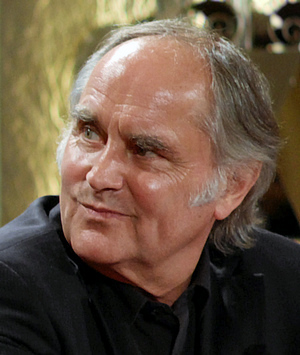
Michael Alexander Verhoeven was a German film director, screenwriter, film and television producer, and actor. He was also a qualified doctor of medicine. He was considered a political filmmaker.

The Berlin International Film Festival, usually called the Berlinale, is a major international film festival held annually in Berlin, Germany. Founded in 1951 and originally run in June, the festival has been held every February since 1978 and is one of Europe's "Big Three" film festivals alongside the Venice Film Festival held in Italy and the Cannes Film Festival held in France. Furthermore, it is one of the "Big Five", the most prestigious film festivals in the world. The festival regularly draws tens of thousands of visitors each year.

The 1st annual Berlin International Film Festival was held from 6 to 17 June 1951 at the Titiana-Palast cinema. The opening film was Alfred Hitchcock's Rebecca.

The 12th annual Berlin International Film Festival was held from 22 June to 3 July 1962.

Christian Petzold is a German film director and screenwriter. Petzold is part of the 21st century Berlin School film movement. His films have received international recognition and acclaim. He is known for his frequent collaborations with actresses Nina Hoss and Paula Beer. Petzold won the Silver Bear for Best Director for his film Barbara (2012) at the 62nd Berlin International Film Festival.

The Deutsche Filmakademie is a German independently run organization with a focus on filmmaking.
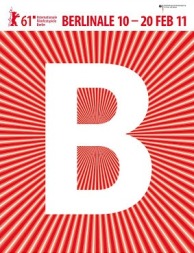
The 61st annual Berlin International Film Festival was held from 10 to 20 February 2011, with actress Isabella Rossellini as the president of the jury. The Coen Brothers film True Grit opened the festival. 300,000 tickets were sold in total during the event, to 20,000 attendees from 116 countries, including 3900 members of the press.
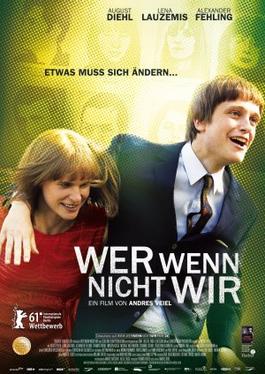
If Not Us, Who? is a 2011 German drama film directed by Andres Veiel and starring August Diehl. The film is set in the late 1940s, the early 1960s, and at the beginning of the Protests of 1968.
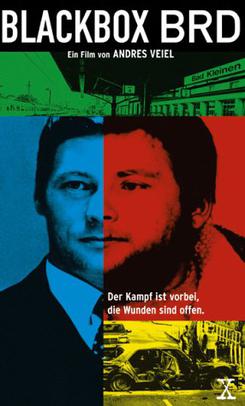
Black Box BRD is a 2001 German documentary film written and directed by Andres Veiel. The film deals with West German politics of the 1970s and 1980s, a period marked by turmoil and the highly publicized activities of the left-wing terrorist group known as the Red Army Faction (RAF).
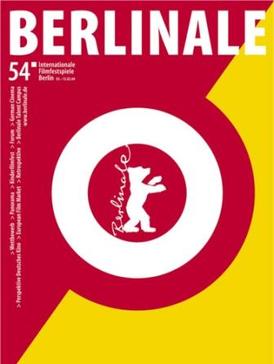
The 54th annual Berlin International Film Festival was held from 5–15 February 2004. The festival opened with out of competition film Cold Mountain by Anthony Minghella. 25 Degrees in Winter by Stéphane Vuillet served as the closing film.
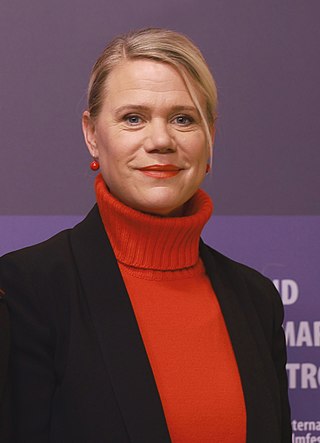
Frauke Finsterwalder is a German film director and screenwriter. Finsterwalder has directed several shorts and documentaries. Her feature film directorial debut, Finsterworld, was released in 2013. For her second feature film, Sisi & I, released in 2023, she was awarded the Bavarian Film Award for Best Director.

Aljoscha Pause is a German filmmaker, director, TV journalist, writer, and producer. He is a member of the Deutsche Filmakademie and the German Academy for Football Culture.

Age of Cannibals is a 2014 German drama film directed by Johannes Naber, starring Devid Striesow, Katharina Schüttler and Sebastian Blomberg. It tells the story of two business consultants who travel to impoverished and corrupt countries where they make shady business deals, never having to leave their hotels. The film is made like a chamber play with stylised and grotesque acting. Principal photography took place from 8 January to 14 February 2013.

The 67th annual Berlin International Film Festival was held from 9 to 18 February 2017 with Dutch filmmaker Paul Verhoeven as president of the jury.

Beuys is a 2017 German documentary film directed by Andres Veiel about the German artist Joseph Beuys. It was selected to compete for the Golden Bear in the main competition section of the 67th Berlin International Film Festival.

Anne Zohra Berrached is a German film director and screenwriter.
Bettina Stephanie Walter is a German documentary film producer.

Monika Borgmann-Slim is a German–Lebanese journalist, award-winning documentary filmmaker, and archivist. She is an activist against what she describes as Lebanon's culture of impunity and Vergangenheitsbewältigung, countering official amnesia about the Lebanese Civil War (1975–1990). She is the widow of the Lebanese filmmaker, archivist and activist Lokman Slim, who was assassinated in 2021.

Thomas Kufus is a German film producer especially known for documentary films.
The murder of Marinus Schöberl was committed on 13 July 2002 in the Potzlow district in the Brandenburg state of Germany. The crime was committed by three young right wing extremists which attracted widespread media attention. Later there were also theatre productions and film documentaries inspired by the case.
{{cite web}}: CS1 maint: archived copy as title (link)